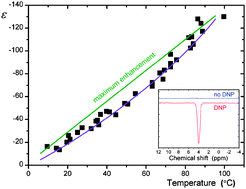Determination of the temperature dependence of the dynamic nuclear polarisation enhancement of water protons at 3.4 Tesla
Abstract
It is shown that the temperature dependence of the DNP enhancement of the NMR signal from water

* Corresponding authors
a
Department of Physics, University of Warwick, Coventry CV4 7AL, UK
E-mail:
r.dupree@warwick.ac.uk
It is shown that the temperature dependence of the DNP enhancement of the NMR signal from water

 Please wait while we load your content...
Something went wrong. Try again?
Please wait while we load your content...
Something went wrong. Try again?
E. V. Kryukov, K. J. Pike, T. K. Y. Tam, M. E. Newton, M. E. Smith and R. Dupree, Phys. Chem. Chem. Phys., 2011, 13, 4372 DOI: 10.1039/C0CP02188A
To request permission to reproduce material from this article, please go to the Copyright Clearance Center request page.
If you are an author contributing to an RSC publication, you do not need to request permission provided correct acknowledgement is given.
If you are the author of this article, you do not need to request permission to reproduce figures and diagrams provided correct acknowledgement is given. If you want to reproduce the whole article in a third-party publication (excluding your thesis/dissertation for which permission is not required) please go to the Copyright Clearance Center request page.
Read more about how to correctly acknowledge RSC content.
 Fetching data from CrossRef.
Fetching data from CrossRef.
This may take some time to load.
Loading related content
